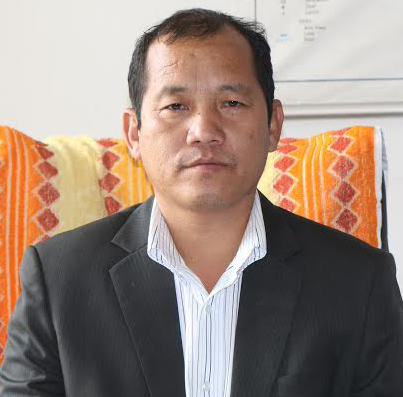 Ganesh Man Pun, Nepal’s new Minister for Commerce and Supplies, has a huge responsibility of steering the country out of the current quagmire of fuel crisis and shortage of daily essentials in the market as a result of the undeclared Indian ‘embargo’ along the Nepal-India border. The recent signing of a crucial petro deal between Nepal and China has paved the way for bringing fuel from China and Minister Pun has been given the important responsibility of implementing the deal. In this regard, APD queried Minister Pun about the new oil deal with China and short supply of essential commodities like fuel, gas and food provisions in the market. Excerpts:
Ganesh Man Pun, Nepal’s new Minister for Commerce and Supplies, has a huge responsibility of steering the country out of the current quagmire of fuel crisis and shortage of daily essentials in the market as a result of the undeclared Indian ‘embargo’ along the Nepal-India border. The recent signing of a crucial petro deal between Nepal and China has paved the way for bringing fuel from China and Minister Pun has been given the important responsibility of implementing the deal. In this regard, APD queried Minister Pun about the new oil deal with China and short supply of essential commodities like fuel, gas and food provisions in the market. Excerpts:
China and Nepal have signed a new oil trade deal paving the way for Nepal to import fuel from China. How serious is the Nepal government to implement the deal?
In the past we made the mistake of completely relying on a single country and single route for supply of all the petroleum products necessary for the country. This put us in a very vulnerable situation time and again and because of which the whole country had to suffer. So it has become necessary for us to find and explore multiple supply sources and alternatives. But we also have to understand that it is necessary for a landlocked country like ours to import oil from both India and China because we are sandwiched between these two large economies. With the arrival of Chinese oil following the oil deal, it has become clear that China can be another viable source of fuel for Nepal apart from India.
Many people in the country suspect that the government would altogether forget about importing fuel from China once India resumes normal supply. What do you have to say to this?
The fact that we have signed an agreement to import fuel from China means that we are serious regarding this issue. The government of Nepal is determined to fulfill certain percentage of Nepal’s total fuel demand through imports from China. To start with, we have plans to meet one third of the domestic oil demand through imports from China.
How long is it going to take for Nepal to start importing Chinese oil under the new commercial deal?
At the moment, I cannot say for sure when Nepal will start importing oil from China under the commercial deal. After signing of the MoU, other technical issues, including pricing needs to be sorted out through negotiations. Once we sort out these issues, we would be able to set the date for commercial import of Chinese oil into Nepal.
A section of the Indian media believes that Nepal played ‘China card’ against India by signing the fuel deal. What do you have to say to this?
It is a mistake on their part to construe that Nepal is playing ‘China Card’ against anyone by signing the oil deal with China. We don’t believe in playing anyone country against other. We did what was necessary for a country facing a serious crisis and to prevent similar situation from happening in the future. The reality that Nepal should not depend on a single country for smooth supply of essential commodities such as oil has finally dawned on our leaders and policy makers. So we are just seeking alternative sources to ensure unobstructed fuel supply to solve the current problem. We have to diversify our oil import sources as much as possible.
The fuel storage capacity of Nepal Oil Corporation is said to be less than 20 days. Has there been any effort to increase the capacity?
As per the United Nations standard, a country should have enough fuel to last for 90 days if normal supply is disrupted. But the current fuel crisis showed that Nepal has a very low fuel storage capacity, something that is very alarming. So, the priority will be given to increase the capacity. Once the current fuel crisis ends, my focus will be on increasing NOC’s fuel storage capacity.
(Source: Asia Pacific Daily, Kathmandu issue)

